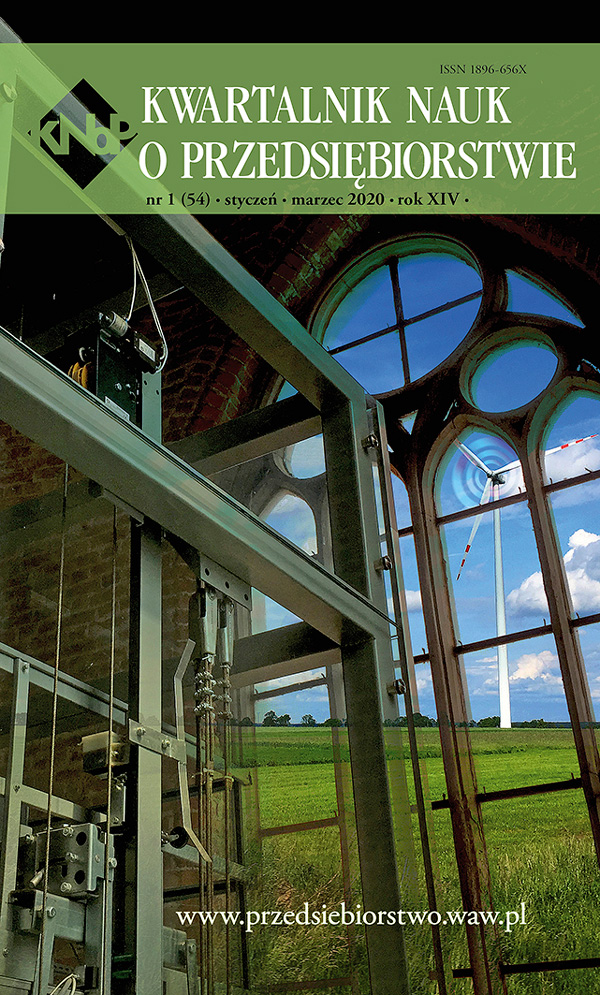Regulatory changes and the market of initial public offerings (IPO) in Poland
Main Article Content
Abstract
One of the ways of financing enterprises in Poland may be obtaining proceeds from the issue of shares on the Warsaw Stock Exchange, in particular, through the initial public offering (IPO). The attractiveness of this type of financing is determined by many factors, of which legal regulations are important. The purpose of this article is to analyse and assess the impact of the most important regulatory changes on the attractiveness of initial public offerings on the WSE. In the first place, the new rules in the area of public offerings, which have a direct impact on the perception of IPOs as a form of corporate financing, are examined. In the second, the legal changes concerning the functioning on the stock exchange market, which also indirectly affect the companies’ decisions to enter the stock exchange, are investigated. Finally, the significance of legal changes for the IPO market in Poland is presented. The new regulations on public offerings do not restrict access to the stock exchange market, while changes in the sphere of a company’s functioning on the stock exchange may be perceived by issuers as a significant nuisance, discouraging companies from making a decision to list their shares on the Warsaw Stock Exchange.
Downloads
Article Details
The author of the article declares that the submitted article does not infringe the copyrights of third parties. The author agrees to subject the article to the review procedure and to make editorial changes. The author transfers, free of charge, to SGH Publishing House the author's economic rights to the work in the fields of exploitation listed in the Article 50 of the Act of 4 February 1994 on Copyright and Related Rights – provided that the work has been accepted for publication and published.
SGH Publishing House holds economic copyrights to all content of the journal. Placing the text of the article in a repository, on the author's home page or on any other page is allowed as long as it does not involve obtaining economic benefits, and the text will be provided with source information (including the title, year, number and internet address of the journal).
References
2. Brau J.C., Fawcett S.E. (2006), Initial public offerings: An analysis of theory and practice, “Journal of Finance”, Vol. 61(1).
3. Brav A., Geczy C., Gompers P.A. (2000), Is the abnormal return following equity issuances anomalous?, “Journal of Financial Economics”, Vol. 56.
4. Cai K., Zhu H. (2015), Cultural distance and foreign IPO underpricing, “Journal of Multinational Financial Management”, Vol. 29(Feb).
5. Certo S.T., Holcomb T.R., Holmes R.M. (2009), IPO research in management and entrepreneurship: Moving the agenda forward, “Journal of Management”, Vol. 35(6).
6. Helbing P. (2019), A review on IPO withdrawal, Int. Rev. Financ. Anal., Vol. 62.
7. Lewellyn K.B., Bao S.R. (2014), A cross-national investigation of IPO activity: The role of formal institutions and national culture, “International Business Review”, Vol. 23(6).
8. Nowosad W. (2018), Nowe rozporządzenie prospektowe – analiza wybranych zmian legislacyjnych, „Przegląd Prawa Handlowego”, Nr 10.
9. Okoń Sz. (2012), New approach to remuneration policy for investment firms: A polish capital market perspective, “Contemporaty Economics”, Vol. 6(1).
10. Pieczyńska-Czerny I. (2018), Komentarz, w: Prawo rynku kapitałowego, Wierzbowski M., Sobolewski L., Wajda P. (red.), Warszawa, Legalis.
11. Rycerski A. (2018), Własny zamiar wywołania cenotwórczego zdarzenia w świetle definicji informacji poufnej, „Przegląd Prawa Handlowego”, Nr 1.
12. Signori A. (2018), Zero-revenue IPOs, Int. Rev. Financ. Anal, Vol. 57.
13. Woźniak R. (2018), Obowiązek upublicznienia informacji poufnej a zakaz jej wykorzystania, „Przegląd Prawa Handlowego”, Nr 1.

